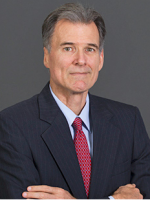Renowned economist Hugh F. Kelly (PhD, CRE), Clinical Professor in New York University’s Schack Institute of Real Estate and the 2014 national Chairman of The Counselors of Real Estate, led a discussion at a CREW-Miami luncheon regarding issues affecting the commercial real estate market in 2015 and gave his annual economic predictions.
Some of the highlights from his presentation:
- Labor Markets. In 2014 there were approximately 2,952,000 new jobs and Hugh predicts there will be 3.2 million new jobs in 2015. Unemployment was down 5.6% from the prior year. Notwithstanding the increase in the number of new jobs, Hugh discussed the need to prepare for a change of state from a labor surplus economy to a labor shortage one, and that the global talent search must start now. Hugh suggested that without a change in our immigration policy, the U.S. as a whole will face a shortage of workers. Employers will need to figure out how to retain employees by offering better benefit packages and incentives, which will be eventually followed by an increase in wages. Employment and job growth is essential for the real estate sector because it is the catalyst for increased sales in retail and spending in the hospitality market, as well as for the rise in office occupancy.
Miami employment proved more resilient than the U.S. in the last recession and as well as in its recovery.
- Capital Markets. The U.S. is still favored by domestic and offshore investors for capital investments because of the broad choices in the U.S. property market. There was $366 billion of inbound investment in U.S. real estate in 2014. New York City led all U.S. cities, with over $49 billion in inbound investment, followed by Los Angeles ($24.9 billion), San Francisco ($15.2 billion) and Washington D.C. ($15 billion). Miami rounded up the top twelve U.S. cities with $6 billion dollars in real estate inbound investment.
Canada led foreign investment in U.S. real estate for 2014 with $15 billion, followed by China and Germany, both with approximately $6 billion in investments. Canada led global investments in the U.S. in the office, industrial and multifamily sectors. Japan led global investments in the U.S. hotel sector, with over $2 billion in investments, closely followed by Canada with almost $2 billion in investments. New sources of foreign investment has come from countries such as Israel, Korea, Egypt, Russia and Mexico.
Hugh said that we are oversupplied (approximately 55%) in the amount of equity for investing in the real estate market in 2015. Competition in lending has been increasing, resulting in lenders slowly making their equity underwriting standards less rigorous.
CMBS volume is expected to reach $100 billion in 2015, with single-assets making a comeback.

- Miami. Hugh noted that Miami was getting a lot of respect from national real estate experts who are betting big on Miami’s success in this real estate sector. Experts believe that Miami has fully recovered from the housing crisis, as the construction market is thriving and it continues to bring a flow of foreign investment, including foreigners who are also setting up additional operations here. Miami led the nation in the hotel sector, was 2nd in retail, 9th in multifamily, 19th in office, 34th in industrial and 40th in single family housing (cities were ranked according to the number of “buy” recommendations). See Emerging Trends in Real Estate 2015.
Hugh boasted that young workers were finding Miami very attractive to relocate to and that as a city, we were reaching demographics nearing New York City levels in this area.
- Millenials and Boomers. Taken together, millennials and boomers are 160 million strong, which amounts to half of the U.S. population. There are 83 million millennials who show a preference for dense, hip urban centers. Aging boomers are not necessarily headed to retirement communities anymore, many are moving back to the cities and that could influence the market for the next decade. Hugh also noted that retiring baby boomers will soon outnumber the new generation Y workers.





 />i
/>i


